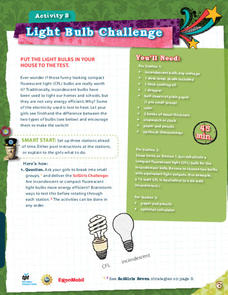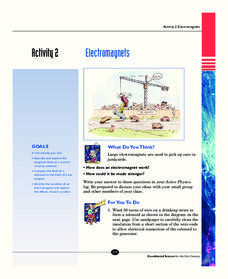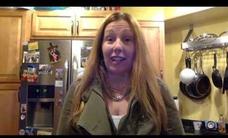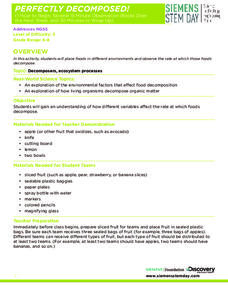It's About Time
Building an Electric Motor
Rev your motor with a hands-on activity about electricity. Learners build their own electric motor before reading a handout and answering some questions.
IOP Institute of Physics
Physics in Concert
What do physicists and musicians have in common? A lot more than you might think. After first viewing a slide show presentation and completing a series of skills practice worksheets on the physics of light, sound, and electricity, young...
NASA
Feel the Heat
Heat water up like a NASA engineer. Using the engineering design process, investigators create a system to trap and move heat through a water-filled tube. Designers participate in a post-activity discussion that highlights the role of...
PBS
Light Bulb Challenge
Efficiency equals money where homes are concerned. A comparative lesson asks learners to measure heat output of incandescent and compact fluorescent light bulbs. They follow their investigation with calculating the cost of using the two...
It's About Time
Electromagnets
Young scientists build their own electromagnet and test it by picking up paperclips. Analysis questions evaluate knowledge at the end of the activity.
Teach Engineering
Thirsty for Gold
In the last portion of the six-part unit, teams perform an experiment with gold nanoparticles to determine which sport drink has the most electrolytes. The nanoparticles are used as chemical sensors and fluoresce in different wavelengths...
WindWise Education
How Can I Design Better Blades?
Small groups use information they have learned about blade construction to design, build, and test their own concepts. The teams compete in order to determine which design has the best average power output.
PBS
Zip Line
Slide all the way to the bottom. Using the design process, pupils create a carrier for a ping pong ball that will travel down a zip line. Learners test their carriers and determine solutions to issues they encounter to complete the third...
University of Waikato
Melting Glacial Ice
There are many factors that affect how fast the glaciers are melting. A lab investigation has learners examine how the surrounding water affect the rate glaciers melt. They collect data from two samples of ice to determine how quickly...
DiscoverE
At Home: Keep a Cube Activity
Let cooler heads prevail. Future engineers first learn about heat transfer and insulation. They then design and build a contraption that will prevent an ice cube from melting for as long as possible.
PBS
Insulation Station
It's all about the material. Learners experiment with different substances as they try to keep an ice cube from melting. They draw conclusions by answering a set of questions about the types and amount of material that had the best result.
Teach Engineering
Investigating the Properties of Plastic and its Effects on the Environment
Pore over the properties of plastic. Working through four different stations, pupils investigate some properties of plastic, including chemical decomposition, mechanical breakdown, density, and the ability to infiltrate the food chain....
Bonneville
How to Build a Turbine
Here is a six-minute video of a pair of electrical engineers that illustrate how to build a wind turbine. A list of materials is provided, along with general guidelines for your class. Use this to introduce turbine design to your...
American Museum of Natural History
Light Quest
Grab a partner and shed some light on light. A remote learning resource has scholars play a board game to answer trivia questions about light. They also read about how Einstein contributed to the understanding of light as both a wave and...
Curated OER
Exploring the Water Cycle
The water cycle is one of earth's most easily observable processes, but demonstrating each step within classroom walls can be a challenge. Through a series of videos and quick demonstrations, cover each aspect of the hydrologic cycle in...
NOAA
I Didn’t Do It…Did I?: Make Your Own Greenhouse Effect
How do greenhouse gases affect the climate on Earth? Pupils explore the concept by first building their own apparatuses to model the greenhouse effect. Then, they record data to measure temperature change and determine that the amount...
Discovery Education
Perfectly Decomposed!
We all know someone who won't eat the banana with a brown spot, the grape with a dimple, and the apple with a bruise. Scholars use different fruits to explore what happens when fruits really start to decompose. They set up an experiment...
Discovery Education
Motion in the Ocean
How do temperature changes affect ocean currents? Scholars explore convection currents by demonstrating the flow of water in a baking dish. They use ice, heat, and food coloring to see currents. Then, they draw conclusions about their...
Curated OER
Cell City Project - You are the Designer!
How can something as large as a city and as small as a cell have anything in common? That is exactly the question young scientists explore with this engaging life science project. Choosing to focus on a city, school, factory, or other...
NOAA
Seafood and Human Health
Whether your young biologists realize it or not, humans play a significant role in marine ecosystems. To help them understand this fact children first create graphical representations that show homo sapiens' place in marine food chains,...
Curated OER
More on Conduction and Convection
Why do some items feel colder when they are the same temperature? How should you keep your soda cold? What makes the wind blow? These are just some of the things middle schoolers discover when completing a lesson on conduction and...
Messenger Education
Sensing the Invisible: The Herschel Experiment
The electromagnetic spectrum includes everything from very powerful gamma rays (which are used to treat cancer) to much weaker radio waves (which include microwaves). Through a hands-on activity, scholars explore the temperature...
Teach Engineering
Battle of the Beams
Make the strongest beam possible using taffy? Groups mold a taffy-water mixture into a beam and a reinforcing material of their choice. To finish the final installment of a two-part series, participants test its strength by adding...
Discovery Education
Smoke on the Water
How do clouds form? Learners demonstrate the formation of clouds and the water cycle by testing four different setups in a plastic bottle. They identify the key components of a cloud to help them understand the process of cloud...
Other popular searches
- Potential and Kinetic Energy
- Energy Pyramid
- Renewable Energy
- Energy Transformation
- Forms of Energy
- Kinetic Energy
- Energy Transfer
- Thermal Energy
- Heat Energy
- Solar Energy
- Solar Power
- Potential Energy

























